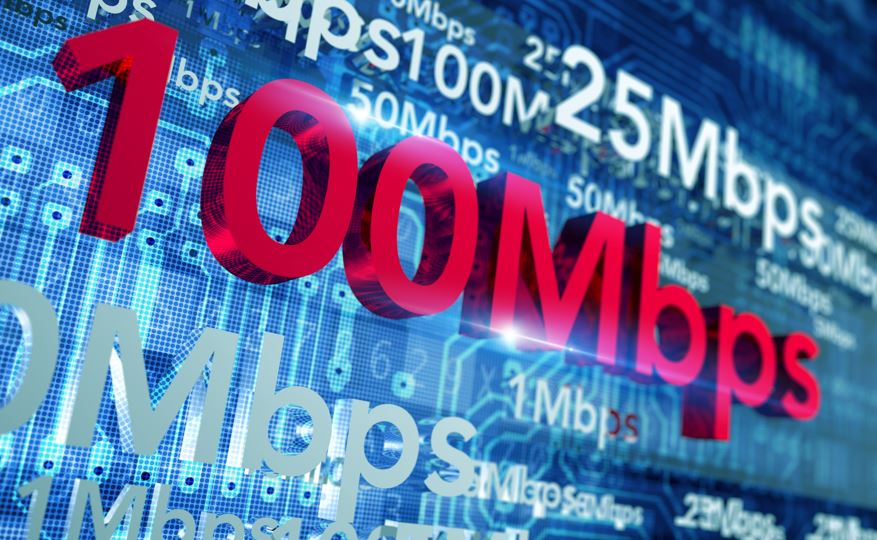A simple Mbps and Mb converter
28th April 2024
Jeff Patton
Have you ever found yourself confused about internet speeds and the terms Mbps and Mb? Understanding the difference between these two units of measurement is crucial when it comes to choosing the right internet plan, monitoring your internet speeds, and troubleshooting any connectivity issues.
In this article, we will explore what Mbps and Mb are, how they are used in internet speeds, and why it is important to grasp these concepts. We will debunk some common misconceptions surrounding Mbps and Mb. Let's dive in!
What Is Mbps?
Mbps stands for megabits per second and is a unit of measurement that describes the data transfer rate of a network or internet connection. It is commonly used to measure the speed at which digital information, such as files, videos, and websites, can be transmitted over computer networks or telecommunication systems. Mbps is a critical factor in determining the efficiency and reliability of network speed, impacting various online activities like gaming, streaming services, file sharing, data download, and upload speed.
What Is An Mb?
An Mb refers to a megabyte, a unit of data size measurement that is commonly used to quantify the amount of digital information or data storage capacity. Unlike Mbps, which measures data transfer rate, a megabyte represents the actual size of digital files or data. In computing, a megabyte is equivalent to 1,048,576 bytes, and it is used to describe the size of files, documents, images, and other forms of digital content.
This unit plays a crucial role in the digital world where data size matters significantly. For instance, when you download a movie from the internet, its size is often measured in megabytes. When you take photos on your smartphone, each image's size is measured in megabytes to indicate how much space it occupies. Understanding the concept of a megabyte is essential for managing storage space on devices efficiently and ensuring smooth data transmission processes.
What Is The Difference Between Mbps And Mb?
The key difference between Mbps and Mb lies in their measurement units and what they represent in the realm of digital communication and data processing. Mbps focuses on data transfer rate, indicating how quickly information can be transmitted, while Mb pertains to data size, quantifying the actual amount of digital information or storage space. Understanding this distinction is crucial for effectively managing network performance, calculating data transfer efficiency, and ensuring smooth data exchange in various digital environments.
This differentiation is significant as it ensures accurate communication and comprehension when discussing internet speeds and file sizes. For instance, when browsing a website, the Mbps value signifies how fast data is being downloaded or uploaded. On the other hand, understanding Mb is vital for managing file storage, determining the size of documents, images, or videos.
Conversion tools that can seamlessly switch between Mbps and Mb assist in streamlining these processes and enable users to interpret and compare data metrics more efficiently.
How Are Mbps And Mb Used In Internet Speeds?
Mbps and Mb play vital roles in determining internet speeds and bandwidth capabilities. Mbps, as a measure of data transfer rate, influences the speed at which data is transmitted over a network or internet connection. On the other hand, Mb, representing data size, affects the volume of information that can be processed or stored. Together, these units of measurement impact network speed, data transmission efficiency, and overall data processing performance in various digital communication settings.
A higher Mbps value signifies faster data transfer speeds, enabling smoother streaming, quicker downloads, and seamless browsing experiences. When Mbps is optimized, it ensures that data packets are transmitted swiftly and accurately between devices, enhancing real-time communication and reducing lag.
Similarly, Mb plays a crucial role in determining the size of files that can be uploaded or downloaded within a given timeframe, affecting tasks like file sharing, video conferencing, and cloud storage. Efficient utilization of both Mbps and Mb is essential for maintaining an optimal balance between speed and data capacity in network operations.
What Is A Simple Converter For Mbps And Mb?
A simple converter for converting between Mbps and Mb is a valuable tool for individuals seeking to understand and compare data transfer rates and data sizes in various digital contexts.
This conversion tool facilitates the transformation of internet speed measurements into data size metrics and vice versa, enabling easy calculations and comparisons for efficient data exchange and processing.
Users can utilize such tools to seamlessly convert between Mbps and Mb to optimize their network performance and ensure effective data transfer and communication processes.
By streamlining the ability to translate Mbps into Mb and vice versa, this converter simplifies the technical aspects of managing data flow, enhancing the user's capability to interpret and apply data rates accurately in different technological scenarios.
Understanding The Conversion Formula
To convert between Mbps and Mb, understanding the conversion formula is essential. The formula typically involves multiplying or dividing by a specific factor to switch between data transfer rates and data sizes accurately. By grasping this conversion process, individuals can effectively compare internet speed measurements with data sizes, enhancing their comprehension of network performance and data processing efficiency.
When converting from Mbps (Megabits per second) to Mb (Megabytes), the formula requires dividing the Mbps value by 8 to obtain the equivalent value in MB. Conversely, to convert from Mb to Mbps, simply multiply the Mb value by 8. This conversion is crucial for tasks such as analyzing download speeds, streaming quality, or file transfer rates accurately. By mastering this formula, users can make informed decisions about their internet service providers and optimize their network configurations for improved data transmission speeds.
Using An Online Converter
Online converters offer a convenient and efficient way to convert between Mbps and Mb for individuals seeking quick and accurate calculations. These web-based tools streamline the conversion process by providing instant results and eliminating the need for manual calculations.
They serve as valuable resources for those looking to understand the relationship between internet speed and data transfer rates, allowing users to make informed decisions about their network setups. Online converters help in optimizing data transfer efficiency by enabling users to quickly convert large file sizes into manageable units. This simplification of complex technological aspects fosters a smoother experience for individuals navigating through the intricacies of digital data management.
Manually Calculating The Conversion
While online converters offer convenience, individuals can also manually calculate conversions between Mbps and Mb for a deeper understanding of data transfer rates and data sizes. By manually performing these calculations, users can enhance their grasp of network performance metrics, digital communication processes, and data transfer efficiencies. Manual conversion exercises provide a hands-on approach to analyzing internet speeds and data capacities, empowering individuals to optimize their data processing capabilities.
This hands-on learning method not only allows individuals to delve into the technical aspects of data transfer rates but also helps in developing a more profound comprehension of the intricacies involved in digital communication. Through manual calculations, one can uncover the relationship between Mbps and Mb, gaining insights that extend beyond mere numerical conversions. Such practice fosters a deeper connection with the concept of data transfer efficiency, bridging the gap between theoretical knowledge and practical application in the realm of digital technology.
Why Is It Important To Understand Mbps And Mb?
Understanding Mbps and Mb is crucial for effectively managing internet connections, ensuring network reliability, and troubleshooting data-related issues. By comprehending these units of measurement, individuals can make informed decisions when selecting internet plans, monitoring internet speeds, and addressing data usage concerns. The knowledge of Mbps and Mb enables users to optimize their online browsing experience, enhance network performance, and maximize data transfer capacities in various digital environments.
The distinction between Mbps (megabits per second) and Mb (megabytes) is essential for grasping the speed and amount of data that can be transmitted over the internet. When troubleshooting internet issues, knowing the difference between Mbps and Mb helps pinpoint where potential bottlenecks or slowdowns may occur in the network. It also aids in diagnosing connectivity problems and understanding the limitations or capabilities of different internet service providers' offerings. This understanding empowers users to choose the most suitable internet plans based on their specific needs and usage patterns.
Choosing The Right Internet Plan
When it comes to selecting the right internet plan, understanding Mbps and Mb is essential. By comparing internet speeds, data transfer rates, and available bandwidth, individuals can make informed choices that align with their online browsing habits and data usage requirements. Assessing Mbps and Mb measurements empowers users to select plans that meet their network performance needs, ensuring optimal internet connections and efficient data transfer capacities.
This understanding becomes crucial as Mbps, which stands for megabits per second, determines the speed at which data is transmitted over the internet. On the other hand, Mb, short for megabytes, indicates the size of a file or data transfer. By comprehending these measurements, users can accurately assess the level of bandwidth required for smooth online activities and seamless data streaming.
Choosing the appropriate Mbps and Mb values according to one's usage patterns plays a significant role in enhancing browsing experiences and managing data consumption effectively.
Monitoring Internet Speeds
Monitoring internet speeds involves tracking Mbps and Mb metrics to ensure optimal network performance and efficient data processing. By regularly assessing internet speeds and data transfer rates, individuals can identify potential bottlenecks, troubleshoot connectivity issues, and optimize their network configurations.
Understanding Mbps and Mb facilitates accurate internet speed calculations, enabling users to maintain consistent and reliable data transfer capacities for various online activities.
This monitoring process not only helps in diagnosing speed-related issues but also plays a crucial role in enhancing the overall user experience. Internet speed calculations are fundamental in ensuring smooth streaming, swift downloads, and seamless browsing.
Tracking network speed metrics aids in realizing the full potential of cloud services and online collaboration tools by guaranteeing a stable and high-speed connection. With the increasing reliance on digital platforms for work, entertainment, and communication, monitoring internet speeds has become indispensable for maximizing productivity and minimizing disruptions in today's connected world.
Troubleshooting Internet Issues
When troubleshooting internet issues, the understanding of Mbps and Mb is invaluable in diagnosing network reliability problems, addressing data communication errors, and optimizing data exchange processes. By leveraging knowledge of these units of measurement, individuals can effectively identify connectivity issues, resolve data transfer inefficiencies, and enhance network reliability. Mbps and Mb play a critical role in troubleshooting internet-related concerns, ensuring seamless data communication and efficient data exchange mechanisms.
These measurements serve as key indicators of the speed and efficiency at which data is transmitted across networks. Mbps, or megabits per second, quantifies the rate at which data travels, influencing the overall performance of internet connections. On the other hand, Mb, representing megabytes, measures the amount of data exchanged within a specific timeframe. Understanding these metrics allows users to pinpoint bottlenecks, bandwidth limitations, or transmission errors affecting their online experience, leading to swift and accurate troubleshooting strategies.
What Are Some Common Misconceptions About Mbps And Mb?
Several misconceptions surround the understanding of Mbps and Mb, often leading to confusion regarding bandwidth, data transfer rate comparisons, and data delivery mechanisms. One prevalent misconception involves confusing Mbps with MBps, which can significantly impact calculations of data transfer speeds. Assuming that higher numerical values equate to faster internet speeds can mislead individuals about actual data transfer rates, while overlooking the influence of other factors on network performance can obscure the true relationship between Mbps and Mb measurements.
Understanding the distinction between Mbps and MBps is crucial in comprehending data transfer speeds accurately. Mbps refers to megabits per second, indicating the rate at which data bits are transmitted. On the other hand, MBps, or megabytes per second, accounts for the actual amount of data transferred in a given time. This differentiation is pivotal as eight bits make up one byte, causing discrepancies in perceived speed if not acknowledged. By grasping these nuances, users can gain a clearer grasp of data delivery perspectives and make informed decisions regarding internet services.
Confusing Mbps With MBps
One common misconception is the confusion between Mbps and MBps, which involves misinterpreting data speed measurements and data communication rates. While Mbps represents megabits per second, denoting data transfer speeds, MBps stands for megabytes per second, indicating data delivery rates. Distinguishing between these two units of measurement is crucial for accurately calculating information transfer rates, optimizing data exchange processes, and ensuring efficient digital communication.
This differentiation is fundamental in understanding how much data can be transmitted in a given time frame and the actual volume of data being moved. For instance, when downloading a file, knowing the distinction can help individuals gauge the time needed for completion accurately. This clarity also aids in making informed decisions when selecting internet service plans, as it enables users to match their data usage requirements with the appropriate speed plans, optimizing their browsing experience.
Assuming Higher Numbers Mean Faster Speeds
Another common misconception is assuming that higher numerical values always correspond to faster internet speeds and improved data transfer efficiency.
While higher Mbps values generally indicate faster data transfer rates, other factors such as network technology, data exchange mechanisms, and data transfer efficiencies also influence overall internet speed and network performance. Understanding the multifaceted nature of data transfer technology is essential for grasping the complexities of network speed optimization and efficient data exchange processes.
For instance, the type of network connection, whether it's wired or wireless, can significantly impact speed. The quality of the modem and router, the bandwidth availability from the service provider, and even the number of connected devices sharing the network can all play a role in determining actual internet speeds experienced by users.
Not Understanding The Impact Of Other Factors On Internet Speeds
A prevalent misconception is overlooking the impact of other factors on internet speeds beyond just Mbps and Mb measurements.
Network performance, data transfer capacities, and internet speed measurements are influenced by various elements such as network reliability, data processing capabilities, and effective data transfer technologies.
It's crucial to recognize that internet speed is not solely dictated by download and upload speeds in Mbps or Mb but also by factors like latency, packet loss, routing efficiency, and network congestion. These aspects play a significant role in determining the actual speed and efficiency of data transfer across networks. Ignoring these critical components can result in suboptimal network performance and hinder the overall user experience.















